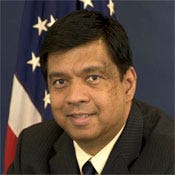Q&A: Silicon Valley Congressman Talks Tech Industry Needs
Silicon Valley Rep. Mike Honda speaks with former Transportation Department CIO Nitin Pradhan on Congress' role in fostering the U.S. technology market, immigration law and more.

Can you talk about your concept of equity in education and its impact on the technology industry?
Rep. Honda:
Equity in education means ensuring that each and every child receives the resources they need to be successful. Parity means funding every child at the same level. Children should not be limited in their opportunities by the zip code they live in. Equitable STEM education means that each and every child will have the tools they need to function in the 21st century. STEM education encourages the creativity and innovation that the tech industry requires.
Discuss the Healthcare Exchanges and how they will impact technology startups and growth companies. Rep. Honda: Affordable Care Act (ACA) requires the use of electronic health records (EHR) and updated codes, which will require additional use of technology among all healthcare providers and increase demand for new products. Grants will be issued for use of information technology to improve resident care. There will be an increase in electronic payment systems (not mandated, but often required by insurance companies). In general, there will be more people utilizing healthcare systems, so the need for more advanced technology (to provide safer, faster and more affordable care) will continue to increase.
Talk about the "Entrepreneur In Residence" program you help set up in federal government. Rep. Honda: I think in many instances the federal government has trouble understanding the issues of entrepreneurs. They don't hear them and understand them as they should. I have been a longtime advocate for strong partnerships between the private high-tech industry and the federal government, and that is why I am reintroducing a bill that would allow proven entrepreneurs to apply their real-life experiences and business knowledge to the federal government -- my Entrepreneur in Residence (EIR) bill. A federal EIR program would make the government more responsive to the current needs of entrepreneurs and enhance partnerships between it and the private sector. The idea is to infuse many of the operational and creative solutions-oriented principles found in startups and small businesses into the inner workings of government agencies.
What is your concept of Government 2.0 and the use of technology in making government more efficient and effective? Rep. Honda: I recently redesigned my website to increase the usability, utility and accessibility of government resources, using crowdsourcing to democratize the way I interact with the public. Constituents can check the status of Capitol tours, flag requests and other constituent functions -- just some of the ways our office can interact more digitally with the public.
More broadly, Government 2.0 means using the most up-to-date technology to ensure openness between the public and government spheres. I utilize Google Hangouts, Twitter town halls, Facebook, liveblogs and more to ensure that I am responsive and reachable to constituents back home.
About the Author(s)
You May Also Like
How to Amplify DevOps with DevSecOps
May 22, 2024Generative AI: Use Cases and Risks in 2024
May 29, 2024Smart Service Management
June 4, 2024







